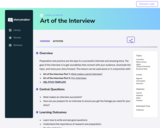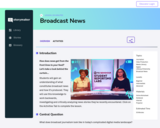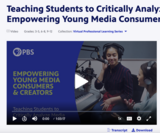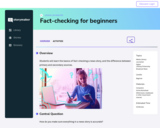
In this lesson, students learn to ask the right questions about the validity of surveys.
- Subject:
- English Language Arts
- Material Type:
- Activity/Lab
- Lesson Plan
- Provider:
- ReadWriteThink
- Provider Set:
- ReadWriteThink
- Date Added:
- 06/05/2024


In this lesson, students learn to ask the right questions about the validity of surveys.

There's no question that students will be able to compose good survey questions by the end of this lesson.

Preparation and practice are the keys to a successful interview and amazing story. The goal of the interview is to get soundbites that connect with your audience, illuminate the topic, and move your story forward.

Students explore using electronic messaging and Internet abbreviations for specific purposes and examine the importance of using a more formal style of writing based on their audience.

My World Media Literacy, developed in partnership by BBC Learning, BBC World Services, and Microsoft, is a free educational platform for students ages 11-14 designed with the goal of increasing global media literacy and the evaluation of information presented in modern journalism. Featuring ten 45-minute lesson plans, each with activities and a companion video, these 21st century resources increase students’ critical thinking skills needed to be responsible consumers of news while inspiring them to become citizen journalists in order to navigate the news and form their own opinions.

How does news get from the front lines to your feed? Let’s take a look behind the curtain... Students will gain an understanding of what constitutes broadcast news and how it’s produced. They will use this knowledge to work backwards, investigating and critically analyzing news stories they’ve recently encountered. Click on the Activities Tab to complete the lesson.

Students examine books, selected from the American Library Association Challenged/Banned Books list, and write persuasive pieces expressing their views about what should be done with the books at their school.

This is an assessment from the Stanford History Education Group's Civic Online Reasoning curriculum. This is to assess how well students can assess information/claims that they find on social media. This is an assessment that is housed on Google Forms. You will be prompted to make a copy of the assessment which you can be distributed to students.

Students become familiar with the similarities and differences between electronic and printed text by comparing the textual aids included in a textbook with those of an educational website.

This lesson takes advantage of students' interest in music and audio sharing. Students investigate multiple perspectives in the music downloading debate and develop a persuasive argument for a classroom debate.

Students investigate how and why copyright law has changed over time, and apply this information to recent copyright issues, creating persuasive arguments based on the perspective of a particular group.

Dr. Naomi Watkins and Robert Austin present about how to help students counter misinformation.

As students engage with and search for information online, they encounter a landscape of false claims, conspiracy theories, and manipulated images and videos, much of which they may believe. This online climate requires more than the common practice of presenting multiple viewpoints and asking students to draw conclusions based on evidence. This presentation will provide strategies, tools, and resources for how to help students navigate this digital world, including ways to foster a classroom environment that supports conversations about tough topics.

By looking at advertising and mass media critically, students begin to understand how the media oppresses certain groups, convinces people to purchase certain products, and influences culture.

By critically analyzing popular television programs, students develop an awareness of the messages that are portrayed through the media.

An Observation and Inquiry Sheet guides students as they analyze and compare their reactions to the value, engagement, and credibility of three websites related to Anne Frank and the Holocaust.

Shilpa, the head of customer success at Scribble, led a discussion about the challenges faced when coaching teachers on using AI and teaching research and writing skills, and introduced Scribble, an app designed to provide an infrastructure for research and writing. She also discussed the unique features of Reese, a research assistant tool integrated into Scribble, and demonstrated the Scribble platform, focusing on the teacher view and the assignment creation process. The conversation ended with discussions on the training and implementation of the tool, with a focus on its use in classrooms, and the potential role of school librarians in supporting its implementation.

Designed for middle and high school teachers, we’ll consider how to tackle misinformation, how to analyze digital media, and why it’s important for your students. Robert Costa is the Moderator of Washington Week, the Peabody Award-winning weekly news analysis series on PBS. Costa is also a full-time national political reporter for The Washington Post, where he covers Congress and the White House and regularly travels the country to meet with voters and elected officials.
Led by PBS Digital Innovator All-Star Leigh Herman and PBS Station Representative Mary Anne Lane, this session highlights exciting resources and models that you can immediately implement in your classroom.
Prioritizing fun, engaging, and accessible tools for your students, the series will highlight techniques for analyzing media, and amplifying student voice through authentic storytelling.

Students will learn the basics of fact-checking a news story, and the difference between primary and secondary sources.

TIn this lesson we will be discussing with high school students how to protect themselves from fake news. We will be doing an activity that has them using these skills in real time.